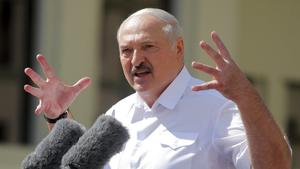 Belarusian President Alexander Lukashenko addresses his supporters gathered at Independent Square of Minsk, Belarus, Aug 16, 2020. (DMITRI LOVETSKY / AP)
Belarusian President Alexander Lukashenko addresses his supporters gathered at Independent Square of Minsk, Belarus, Aug 16, 2020. (DMITRI LOVETSKY / AP)
Belarus President Alexander Lukashenko moved to crack down on opponents after more demonstrations against his 26-year rule brought tens of thousands of people to the streets of the capital and other cities over the weekend demanding his resignation.
Police detained at least four anti-government activists Monday, including organizers of strikes at some of the country’s largest factories and a politician on the opposition’s coordinating council
Police detained at least four anti-government activists Monday, including organizers of strikes at some of the country’s largest factories and a politician on the opposition’s coordinating council.
ALSO READ: Belarusian protesters, defying army, flood Minsk
The moves came a day after more than 100,000 protesters gathered in and around Independence Square in Minsk, despite phalanxes of riot police and barbed-wire barricades spread across the city. Lukashenko was shown later on state television flying into his Minsk residence in a helicopter carrying an automatic rifle and clad in a bullet-proof vest.
The former Soviet collective farm boss is confronting the biggest challenge to his rule after claiming a landslide in the Aug 9 election, which triggered protests and international condemnation of the vote. Opposition leader Svetlana Tikhanovskaya, who fled to Lithuania after the results, has been calling on followers to take to the streets, while urging foreign powers not to intervene.
Opposition leaders vowed to continue the fight Monday despite Lukashenko’s hard line.
ALSO READ: Poland's foreign minister quits amid Belarus crisis
“Turning back the situation is not possible anymore,” said coordinating council member Maria Kalesnikava. “We are united, consolidated, peaceful and demand respect and that our voice, the voice of majority, be heard.”
Activists in the country’s independent unions have called on workers to go on strike to build pressure on the regime, while Lukashenko vowed to shut any factories where there were stoppages. Leaders of the strike movement at Belaruskali, a major potash fertilizer producer, and two large Minsk-based industrial plants were detained, one of whom is on the coordinating council, that Tikhanovskaya has formed for dialog with the regime. Another member of the council was also pulled in by the police.
“We think these actions by the authorities are completely illegal,” said coordinating council member Lilia Vlasova.
Strike Call
Efforts to broaden the strikes appeared to be struggling under pressure from management and the security services. “It’s Brownian motion to which we are trying to bring some order,” said Siarhei Antusevich, Deputy Chairman of Belarusian Congress of Democratic Trade Unions, which is trying to organize strike committees into a single national entity.
ALSO READ: Belarus launches criminal case against new opposition body
After an extremely brutal crackdown on protesters in the first days following the vote failed to scotch the opposition movement, Lukashenko has stuck mainly to shows of force, with riot police not confronting protesters and military drills on his western border, and public derision for his critics.
Lukashenko “is sure that he can rewind to the beginning, let the protests blow off steam, punish some and intimidate others and return his old control over the country,” political analyst Artem Shraibman wrote on the Tut.by news website Monday. “That’s another illusion but to recognize that, Lukashenko will need new, more convincing signs that the country he’s used to no longer exists.”
Russia, Belarus’s closest ally, warned Western countries to stay out of the conflict after congratulating Lukashenko on his election victory. The US and EU have denounced that vote. US Deputy Secretary of State Stephen Biegun is in Lithuania Monday, where he met Tikhanovskaya. He meets Russian officials Tuesday in Moscow.
 People with old Belarusian national flags shout during opposition rally in front of the government building of Minsk, Belarus, Aug 16, 2020. (SERGEI GRITS / AP)
People with old Belarusian national flags shout during opposition rally in front of the government building of Minsk, Belarus, Aug 16, 2020. (SERGEI GRITS / AP)
“I can see why she’s so popular,” Biegun said of the opposition candidate. While he reiterated the call for Belarus to release prisoners, he said the US will leave the choice of leadership to the people. “The US cannot and will not decide the course of the events in Belarus. This is the right of the Belarusian people.”
Kremlin Concern
The Kremlin is still concerned by signs of “external intervention in Belarus’ affairs,” spokesman Dmitry Peskov said Monday, declining to specify what countries he was referring to. He said that the Kremlin is not in contact with the opposition’s coordinating council and that to do so would amount to intervention on the part of Russia.
READ MORE: Macron: EU, with Russia, ready to facilitate dialogue in Belarus
The opposition that backed Tikhanovskaya’s bid for the presidency is seeking to reassure Russia that any change of power wouldn’t necessarily push Belarus closer to the European Union and the North Atlantic Treaty Organization. Russian officials have questioned that and hailed a constitutional-reform program Lukashenko has proposed that’s met a cool reception from his opponents.
Lukashenko’s government has sought to play up the geopolitical stakes in the conflict. Monday, the Defense Ministry said its helicopters repulsed an incursion by eight balloons carrying anti-government symbols from NATO-member Lithuania.
Supporters of the protests there had gathered near the border and released the balloons. Lithuania, for its part, accused the Belarusian helicopters of violating its airspace, according to a statement from its Foreign Ministry.


